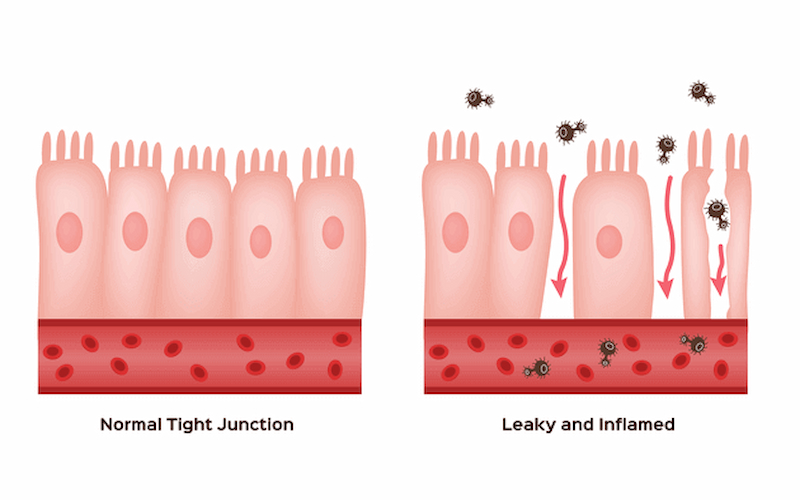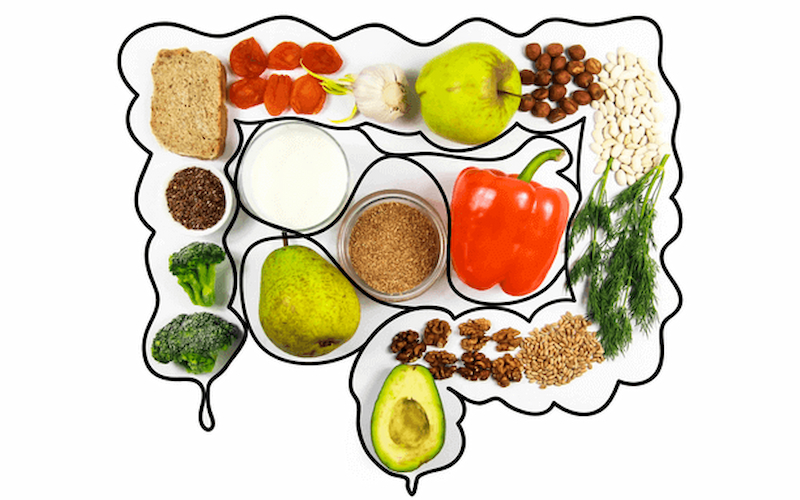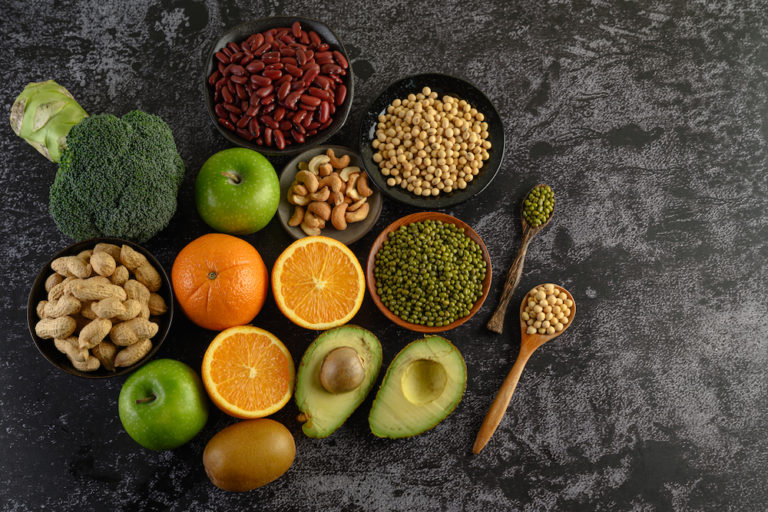The Healthy Gut
Your stomach has a surface area that is 200 times greater than your skin. Similar to how your skin forms a barrier to the outside world, your gut forms a barrier inside your body. It works as a filter by determining what substances should be passed from the digestive tract into the body and what should be kept out. The very thin gut lining is always in contact with nutrients, microbes, toxins, additives, and drugs that pass through your system daily. Your immune system is always analyzing the border of your gut in order to prevent an invasion of toxic pathogens.
What is a Leaky Gut?

Leaky gut syndrome occurs when the intestinal walls let undigested food particles and toxins leak into your bloodstream. Properly digested food is normally absorbed through the cell wall, but when the tight junctions between the gut lining cells loosen, a pathway between the cells opens up, exposing your gut-associated immune system to toxins. As a result, an immune response is triggered which targets food particles and pathogens, but can also attack healthy body cells.
Symptoms of Leaky Gut

Most illness starts in the gut. When substances penetrate through the gut lining that shouldn’t, the immune response creates inflammation, and negatively affects healthy body cells.
Symptoms of leaky gut include:
- Asthma
- Autoimmune diseases
- Brain fog
- Chronic fatigue
- syndrome or fibromyalgia
- The symptoms of digestive problems include bloating, constipation, diarrhea, gas, indigestion, and Irritable Bowel Syndrome (IBS)
- Insomnia
- Joint pain
- Migraines
- Anxiety, depression, ADD, ADHD, or other mood disorders
- Food allergies or intolerances
- A hormonal imbalance, such as polycystic ovarian syndrome or PMS
- Seasonal allergies
- Skin problems, including acne, eczema, and rosacea
- Weight gain (partly due to water retention)
What Causes Leaky Gut?
Because the gut lining is thinner than a single hair strand, it is sensitive to factors that may cause cell damage. Many triggering events, such as the ones that follow, can disrupt the gut flora, compromise the tight junctions between cells, and lead to a leaky gut:
- Chronic Stress
- A common use of NSAIDS includes aspirin, ibuprofen, Advil, and Aleve
Infections - Ingestion of emulsifiers
- Lack of fiber or phytochemical intake
- Lack of probiotic and prebiotic foods
- Low stomach acid
- Poor dietary choices: the SAD (standard American diet) is high in starch, sugar, and processed fats
- Systemic inflammatory disease
- Environmental toxins, pesticides (glyphosate), and preservatives
- Use of antibiotics
- Use of acid blockers
- Use of steroid medication
How to Heal a Leaky Gut

Good health requires a healthy digestive system. Functional medicine identifies the root of what is causing leaky gut in order to heal the whole issue. There are 5 primary steps that heal the digestive system and lead to symptom improvement. These steps are recommended by the Functional Medicine Center Atlanta.
Remove
Eliminate triggers that negatively affect the gut lining, such as:
- Antibiotics
- Bacteria or yeast overgrowth
- Chronic stress
- Exposure to pesticides or preservatives
- Foods that trigger intolerance, sensitivity, or allergy
- Heavy metals
- Inflammatory foods (sugar, flour, gluten)
- Negative thoughts or emotions
- Parasites
- Processed foods
- Toxic people
This step might involve using an allergy elimination diet to identify food triggers or a stool test to analyze the gut function.
Replace
When the gut is inflamed, it does not secrete digestive enzymes to properly digest foods and absorb nutrients. You can aid in your healing process by replacing digestive enzymes that may have been compromised.
- Bile acids
- Digestive enzymes
- Hydrochloric acid
It improves the breakdown of proteins, fats, and carbohydrates. Breaking foods down into its component parts (ex: protein to amino acids) helps prevent an inflammatory immune reaction.
Reinoculate
Your gut contains beneficial bacteria that help you digest food and keep harmful bacteria away. You can support your digestive system by consuming probiotic foods or supplements that contain beneficial intestinal bacteria.
Fermented foods are a good source of probiotics:
- Kefir
- Kimchi
- Kombucha (no sugar added)
- Kvass
- Sauerkraut
*Remember – pickles are preserved through the acidity of vinegar, which is not the same as the fermenting process. Therefore, they won’t be helpful in the gut healing process. Prebiotics are essential to the survival and growth of probiotics in the colon. Prebiotics can be found in supplement form, but it is recommended to include foods high in soluble fiber and phytonutrients in your diet, such as:
- Artichokes
- Asparagus
- Chicory
- Cruciferous vegetables
- Garlic
- Leeks
- Onion
Eating a variety of healthy, organic food is what our gut needs to thrive. One should eat something from every color of the rainbow every day. Going to a more plant-based, high-fiber diet can change the microbiome within 48 hours!
Repair
You can help your gut lining repair itself by ingesting key nutrients that may be in missing in a leaky gut:
- Antioxidants (vitamins A, C, and E)
- Collagen
- Fish oil
- Glutamine
- Zinc
Rebalance
Your lifestyle choices highly impact your gut health as well.
- Find healthy ways to manage stress and negative emotions
- Meditate
- Exercise
- Get adequate sleep






